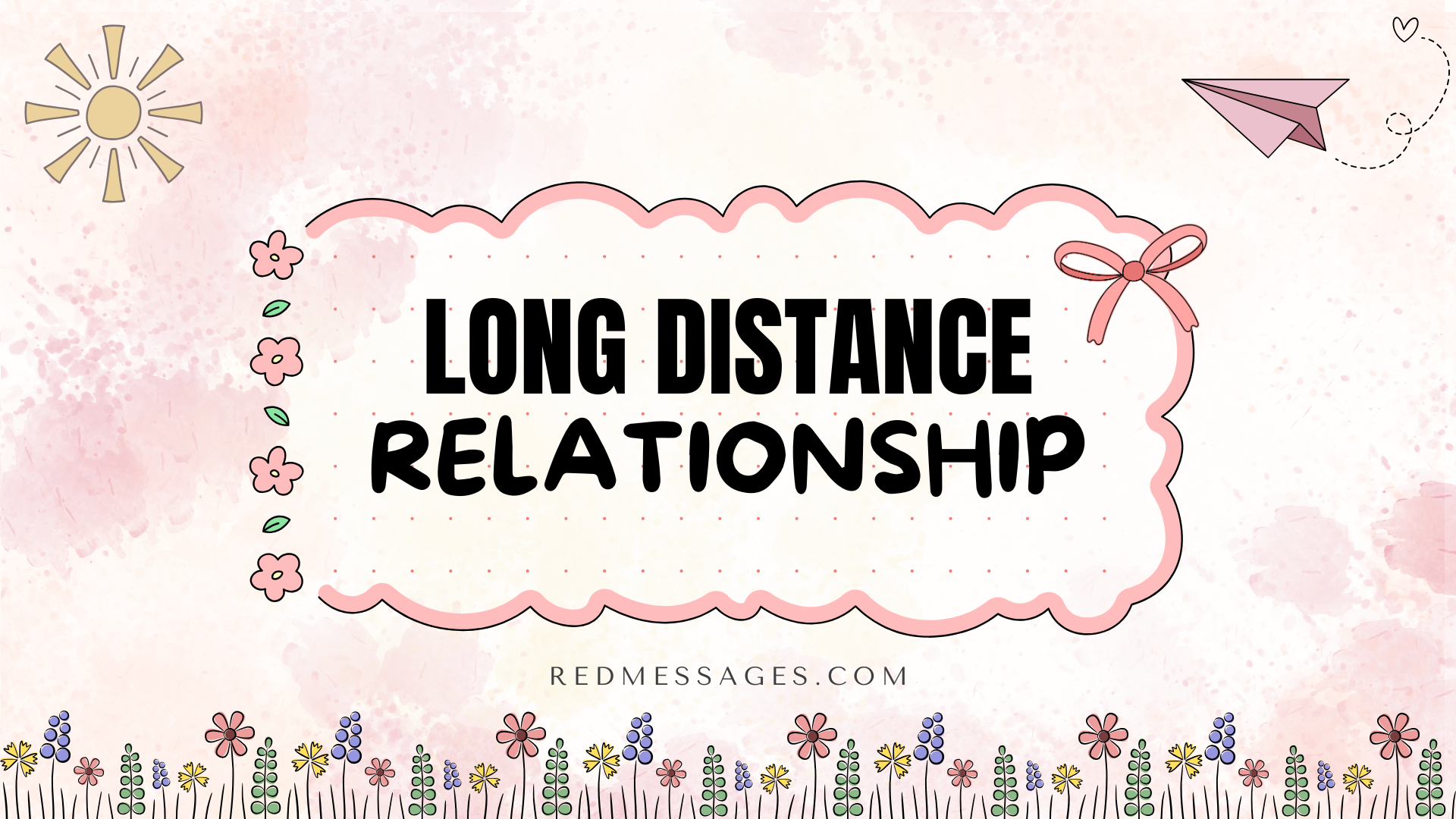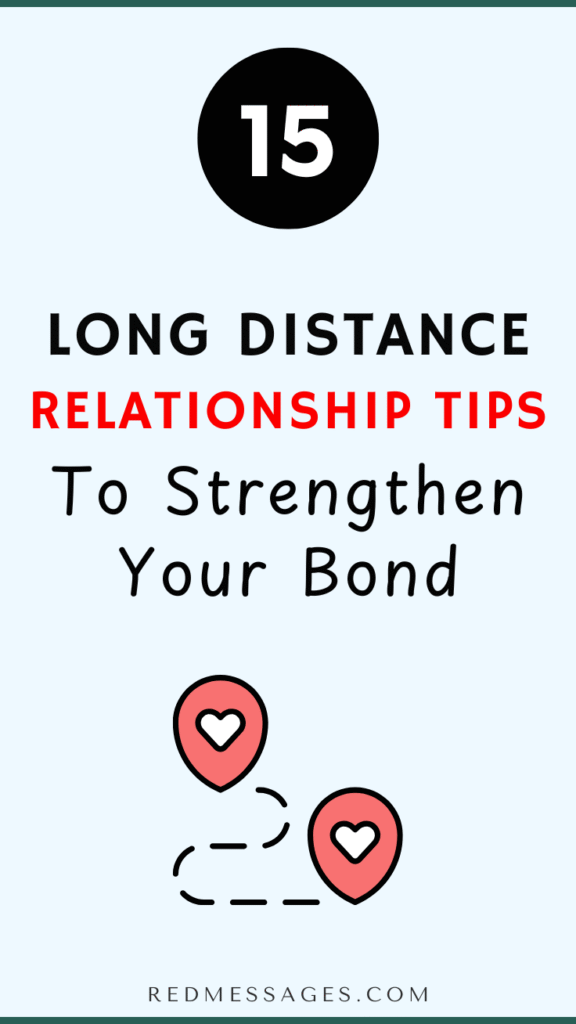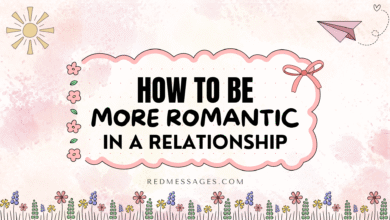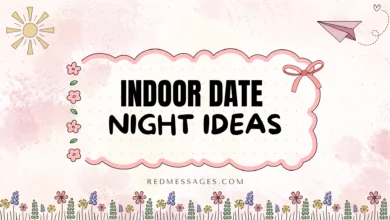15 Long Distance Relationship Ideas To Keep The Spark Alive

Let me guess, you’re here because someone just dropped the “I’m moving across the country”, or maybe you’ve fallen for someone who lives three time zones away.
Trust me, I’ve been there, and I’m about to give you the unfiltered truth about making long distance relationships work.
After seven years of helping couples navigate the choppy waters of love, I’ve seen it all. The tearful Skype calls at 2 AM, the airport reunions that make everyone around you jealous, and yes, the relationships that didn’t make it past month three.

But here’s what I’ve learned: long distance relationships aren’t just about surviving the distance, they’re about thriving despite it.
So grab your favorite coffee (you’ll need the caffeine for those late-night video calls), and let’s dive into what really works when your heart is in one place and your person is in another.
1. Be Intimately Naughty

Okay, let’s address the elephant in the room first. Physical intimacy doesn’t have to disappear just because you’re not in the same zip code.
Actually, some of my most successful couples tell me their long distance phase made them more creative and communicative about their desires than ever before.
Technology is your friend here, but I’m not just talking about the obvious stuff. Sure, video calls are great, but have you tried leaving voice messages describing your day in that husky morning voice? Or sending photos of something that reminded you of them, and I don’t mean just selfies.
One couple I worked with started a tradition of sending each other “view from my window” photos every morning. Sounds innocent, right? But they’d add little captions about what they were thinking, feeling, or planning.
It became this intimate window into each other’s daily lives that felt more personal than any generic “good morning” text.
The key is building anticipation. When you know you’ll see each other in person again, every interaction becomes charged with that energy. Use it to your advantage, but remember, intimacy isn’t just physical.
Share your deepest thoughts, your random 3 AM realizations, your weirdest dreams. Make your partner feel like they have exclusive access to the real you.
2. Keep The Communication Alive
Here’s where most long distance couples mess up royally, they think more communication equals better communication. Wrong! I’ve seen relationships die from death by small talk faster than you can say “how was your day?”
Instead of asking the same boring questions every single day, try this: ask questions that make your partner actually think.
What’s something they believed five years ago that they don’t believe now? If they could have dinner with their teenage self, what would they talk about? What’s a skill they wish they could learn instantly?
Real talk: I once had a client who saved her relationship by implementing “assumption-free Wednesdays.” Every Wednesday, instead of assuming they knew what their partner was thinking or feeling, they’d ask.
“I noticed you seemed quiet during our call yesterday, what was going on in your head?” This simple practice prevented so many unnecessary fights and misunderstandings.
Communication in long distance relationships isn’t just about staying in touch, it’s about staying curious about each other.
The moment you stop discovering new things about your partner is the moment your relationship starts dying, distance or no distance.
3. Make The Most Of Time Spent Together
When you finally get those precious in-person moments, don’t waste them arguing about who forgot to take out the trash three weeks ago (yes, this actually happened with one of my couples). Plan ahead, but also leave room for spontaneity.
I always tell couples to have a “reunion ritual”, something you always do when you see each other again. Maybe it’s cooking a specific meal together, watching the sunrise, or just sitting in comfortable silence for ten minutes to soak in the fact that you’re actually in the same room.
But here’s the thing nobody tells you: sometimes those reunion moments feel awkward at first. You’ve been building up this meeting in your head for weeks, and then reality hits and it’s… normal? That’s totally fine.
Give yourselves permission to ease back into physical proximity without the pressure of making every second magical.
One of my favorite pieces of advice: spend at least one of your days together doing absolutely nothing special. Go grocery shopping, do laundry, binge-watch something stupid on Netflix.
These mundane moments are what regular couples take for granted, and they’re actually incredibly bonding.
4. Watch Your Favorite Movies Together
Netflix Party has single-handedly saved more long distance relationships than I have, and that’s saying something 🙂 But seriously, shared experiences are crucial when you can’t create them in person.
Pick shows you can both get invested in, nothing kills the mood like one person being bored out of their mind.
I’ve seen couples get genuinely excited about their weekly “TV date,” complete with synchronized snack preparation and live commentary via text.
Pro tip: Don’t just watch passively. Make it interactive. Create drinking games (or if you don’t drink, make it a “take a sip of water” game, hydration is important, people!).
Predict what’s going to happen next. Rate episodes afterwards. The goal is to create memories around the experience, not just kill time.
One couple I know started a tradition where they’d each choose one completely random movie the other person had to watch, no vetoing allowed.
Some were terrible, some were surprisingly good, but all of them gave them something to laugh about later.
5. Send Gift Packages Filled With Surprises

I’m not talking about expensive jewelry or grand gestures here. Some of the most meaningful packages I’ve heard about contained things like: a playlist burned onto an actual CD (retro!), a small succulent plant, their partner’s favorite candy from their hometown, or a book with personal notes written in the margins.
The best gifts show that you’re thinking about your partner’s daily life and wants, not just special occasions.
Maybe they mentioned their coffee mug broke, or they’re stressed about a work presentation, or they can’t find their favorite childhood snack in their new city.
Here’s what works: care packages with a theme. “Comfort kit” with tea, cozy socks, and a handwritten letter. “Adventure kit” with local maps, a disposable camera, and a challenge to explore somewhere new.
“Nostalgia kit” with photos, candy from your first date spot, and a playlist of songs that remind you of them.
The key is showing you listen to the little things they mention in passing. Those throwaway comments about missing their mom’s cookies or wanting to try rock climbing? Those are gift package gold mines.
6. Pay Him An Unexpected Visit
Okay, this one requires some serious planning and preferably a good relationship with their roommates/family for intel. But done right, surprise visits are relationship rocket fuel.
I’ve orchestrated a few surprise visits in my time (occupational hazard of being invested in my clients’ happiness), and the reactions never get old.
But here’s the crucial part: make sure it’s actually a good time for a surprise. Don’t show up during finals week or when they’re hosting their sister’s baby shower.
The logistics matter: coordinate with someone they trust to make sure they’ll be available and that you won’t be walking into a disaster. Nothing ruins a surprise visit like discovering they’re not home for the weekend.
Also, have a backup plan if the surprise element doesn’t work out. Maybe they spot you at the airport or their friend accidentally spoils it. The important thing is that you made the effort to prioritize being together.
7. Understand Each Other’s Schedules
Time zones are the devil, and I will die on this hill. But seriously, respecting each other’s schedules isn’t just about not calling during work meetings, it’s about understanding the rhythm of each other’s lives.
When does your partner feel most energetic? Are they a morning person or a night owl? What days are typically stressful for them? When do they usually have free time to actually focus on a conversation instead of multitasking?
IMO, this is where a shared calendar becomes your best friend. Not to track each other obsessively, but to understand when your schedules align for quality time versus quick check-ins.
I’ve seen too many fights start because someone felt ignored, when really their partner was just swamped with a deadline they’d forgotten about.
One couple I worked with started putting their “relationship priority times” in their calendars, periods when they’d both be available for more than just a quick text exchange.
It sounds formal, but it actually made their conversations so much better because they weren’t constantly distracted or rushing.
8. Live An Independent Life
This might be the most important section in this entire article, so pay attention. Long distance relationships fail more often because people lose themselves waiting for their partner than because of the actual distance.
You are not half a person waiting to be completed by your relationship. You’re a whole person who happens to love someone far away. There’s a massive difference, and maintaining that perspective will save your sanity and your relationship.
Here’s what independence looks like in practice: You have friends your partner has never met. You try new restaurants without feeling guilty.
You make plans for your weekend that don’t revolve around your video call schedule. You pursue hobbies and interests that have nothing to do with your relationship.
I’ve seen people put their entire social lives on hold because they felt guilty having fun without their partner.
Don’t do this! Your partner fell in love with a person who had their own interests and friendships. Don’t disappear that person in the name of loyalty.
Actually, having independent experiences gives you more interesting things to talk about during your calls. “I tried rock climbing today and totally embarrassed myself” is infinitely more engaging than “I missed you all day and didn’t do anything else.”
9. Make Plans Together
Future planning in long distance relationships walks a fine line between hope and pressure. You want something to look forward to, but you also don’t want to create so much expectation that reality can’t compete.
I recommend having three types of plans: immediate (your next visit or call), medium-term (something fun in the next few months), and long-term (closing the distance, if that’s the goal). This gives you various timelines to anticipate without putting all your emotional eggs in one basket.
The immediate plans should be specific and exciting. Not just “we’ll hang out when I visit,” but “we’re going to try that new taco place you found and then have a movie marathon in our pajamas.” Details make plans feel more real and give you both something concrete to look forward to.
Medium-term plans might be bigger trips, meeting each other’s families, or working toward shared goals. Long-term plans… well, let’s talk about those carefully.
Make sure you’re both genuinely on the same timeline for things like moving, commitment level, and life goals. Mismatched expectations about the future destroy more long distance relationships than cheating does.
10. Send Voice And Video Messages
Text messages are fine for logistics, but voice and video messages are where the emotional connection happens. There’s something about hearing your partner’s actual voice, with all its inflections and emotions, that texts can’t replicate.
I recommend voice messages for sharing feelings, video messages for sharing experiences, and saving texts for quick updates and logistics.
When you’re telling your partner about your day, let them hear the excitement in your voice about your promotion or the exhaustion after a tough week.
Video messages are perfect for showing, not just telling. Give them a tour of your new apartment, show them the sunset from your balcony, or record yourself cooking dinner while narrating what you’re doing. It’s like being invited into each other’s daily lives in a way that feels intimate and immediate.
One couple I know started leaving each other video “good morning” messages that they’d watch with their coffee.
Not live calls, just sweet recordings to start each other’s day. They said it felt like having breakfast together even when they were thousands of miles apart.
Working toward something together creates a sense of partnership that transcends physical distance. But I’m not just talking about relationship goals here, I mean personal goals that you can support each other in achieving.
Maybe you both want to get in better shape, learn a new language, save money for travel, or read more books. Having parallel goals gives you things to check in about, celebrate together, and hold each other accountable for.
The key is choosing goals that enhance your individual lives, not just your relationship. If your only shared goal is “see each other more,” you’re setting yourselves up for frustration.
But if you’re both working on things that make you more interesting, accomplished people, you’ll have more to bring to the relationship when you are together.
I love when couples share reading lists, fitness challenges, or creative projects. One pair I worked with both committed to trying one new recipe each week and sharing photos of their attempts.
The disasters were just as fun to share as the successes, and it gave them something to bond over beyond missing each other.
12. Be Supportive

Long distance relationships will test both of you in ways you don’t expect. There will be days when the distance feels impossible, when you’re tired of explaining to people why you’re dating someone they’ve never met, when you wonder if it would be easier to just date someone local.
During these moments, your partner needs support, not solutions. They don’t need you to fix their bad day or convince them that the distance is worth it. They need you to listen, validate their feelings, and remind them that they’re not alone in this.
But here’s the flip side: you also need to be honest about your own struggles without making them your partner’s responsibility to fix.
It’s okay to say, “I’m having a hard time with the distance today, and I need some extra reassurance,” but it’s not okay to say, “This distance is killing me and it’s all your fault for not moving here yet.”
Learn the difference between sharing your feelings and dumping your emotional baggage on your partner. One builds intimacy; the other builds resentment.
This is where long distance relationships can actually have an advantage over regular ones. When you live together, you might take each other’s presence for granted and stop really sharing what’s happening in your inner world. When you’re apart, every detail becomes interesting.
But there’s an art to sharing daily life. Don’t just recite facts, share feelings, reactions, and observations. Instead of “I went to work, then the gym, then came home,” try “My coworker made this ridiculous comment in our meeting that reminded me of something you’d say, and I had to try not to laugh.
Then I tried that new class at the gym you suggested, my legs are still shaking, but I actually loved it.”
Make the mundane meaningful by connecting it back to your relationship or your partner’s interests. You’re not just updating them on your activities; you’re inviting them into your experience and showing them how they’re woven into your daily thoughts.
I tell couples to share at least one specific detail from their day that the other person wouldn’t know otherwise.
Not just “work was fine,” but “I figured out that spreadsheet problem by using the organizational method you taught me.” These connections make your partner feel present in your life even when they’re physically absent.
14. Learn New Skills Together
There’s something incredibly bonding about being beginners at something together. You’re both equally bad at it initially, you can laugh at each other’s mistakes, and you have shared victories when you improve.
Online learning has made this so much easier. You can take the same course, work through the same tutorials, or read the same instructional books.
I’ve seen couples learn guitar together, attempt new languages, try photography challenges, and even work through online therapy or personal development programs.
The key is picking something you’re both genuinely interested in, not just something to do together. Forced togetherness feels forced, but shared curiosity feels natural and exciting.
One couple I know decided to learn to code together with the eventual goal of building a simple app. They’d spend their video calls working through problems, teaching each other concepts they’d grasped, and celebrating small victories.
Even when they got stuck, they were stuck together, which somehow made it less frustrating and more like an adventure.
15. Be Moderate In Your Communication

Here’s the paradox of long distance relationships: you need enough communication to maintain intimacy, but too much communication kills the excitement and mystery that makes reunions so special.
I’ve seen couples burn out from talking constantly, and I’ve seen others drift apart from talking too little. The sweet spot is different for every relationship, but there are some general guidelines that work for most people.
Daily check-ins are good; hourly updates are overkill. You want to share your life with your partner, but you also want to have a life worth sharing. If you’re texting constantly, when do you have experiences that don’t involve your phone?
Quality over quantity applies here more than anywhere. One meaningful 30-minute conversation is worth more than six hours of distracted texting while you’re both doing other things. Be present when you’re communicating, and be present in your own life when you’re not.
I usually recommend couples establish communication rhythms that work for both their schedules and energy levels. Maybe it’s a good morning text, a voice message during lunch, and a video call before bed.
Or maybe it’s longer conversations every other day with quick check-ins in between. Find what feels sustainable and connecting, not obligatory.
Final Thoughts
Look, I’m not going to lie to you, long distance relationships are hard work. They require more intentionality, more creativity, and more faith than regular relationships.
There will be days when you question everything, when you’re tired of living your relationship through a screen, when you wonder if it would be easier to just find someone local.
But here’s what I’ve learned from seven years of helping couples navigate this: the ones who make it don’t just survive the distance; they use it to build something stronger. They become better communicators, more independent individuals, and more intentional partners.
Focus on building the kind of love that can survive anything, and the distance becomes just another part of your story, not the defining factor of it.
Save Pin For Later











